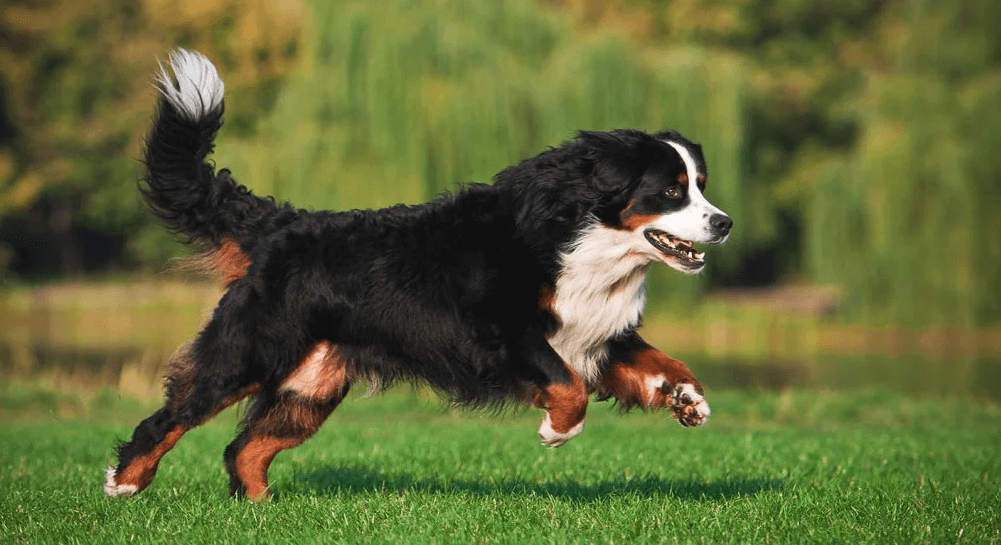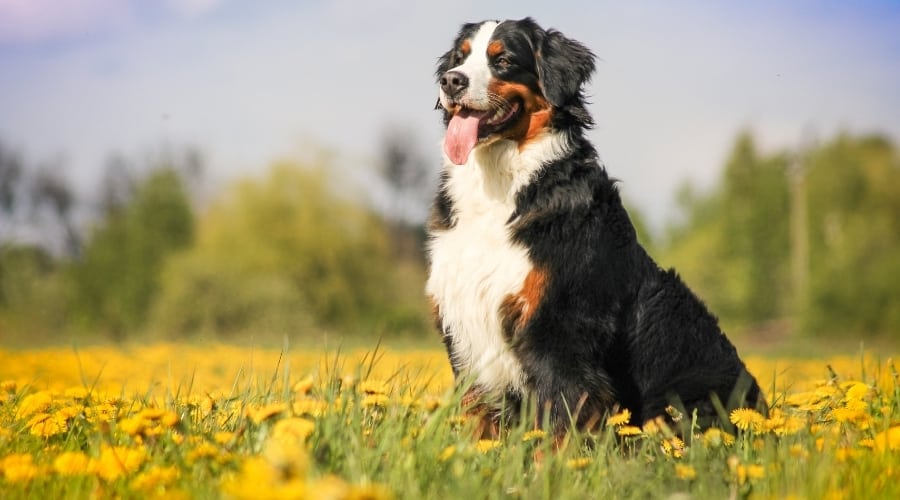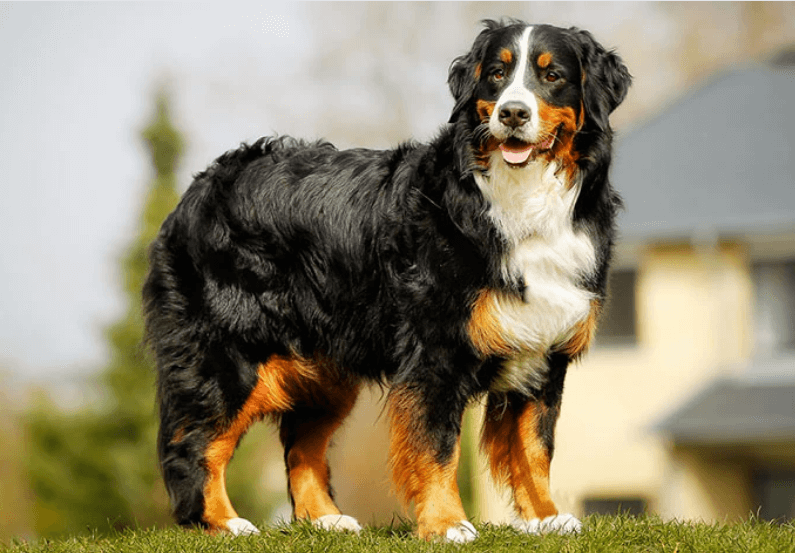Bernese Mountain Dog
Bernese Mountain Dog Breed Information - Petzooie
Bernese mountain dogs, affectionately referred to as "Berners" by their admirers, are recognized for their lovely, peaceful, easygoing demeanor and loyalty to their family, including minor children. Berners are large and powerful canines that can pull carts and serve as security dogs. They have traditionally assisted farmers in Switzerland. When they're not working or playing, these intelligent, devoted dogs want to be with their owners, wherever that may be.
Weight
- Male: 80-115 lbs
- Female: 70-95 lbs
Height
- Male: 25-28 Inches
- Female:23-26 inches
Life Span
- 7-10 Years
Appearance

The Bernese Mountain dog is stunning and elegant. They have floppy ears and oval-shaped dark brown eyes, giving them a kind yet intellectual appearance. Their heads are flat and wide, with a slight furrow and different stops. They have a powerful, straight snout with a black nose at the end. Their topline is level with their withers, giving them a straight back, and they are often described as having a more extended topline than they are tall. Berners have a scissor bite, which means they have a dry mouth.
They have thick necks and broad chests. When they get scared, their bushy tails make an upward swirl, and when the tail is relaxed, it is bushy and held low. With well-arched toes, their forequarters and hindquarters are round and compact.
Berners have twin coats that are thick and smooth, with a longer outer coat and a wooly undercoat. Most of their bodies are coated in jet-black fur with rich rust and brilliant white. They also feature distinguishing markings on their coat and face, such as an inverted cross-shaped white marking on the chest, a white blaze in the center of the eyes, and white tips on the tail.
Temperament
These jovial canines adore kids; they are clever, easy to teach, and excellent watchdogs, yet they are not overbearing. A Bernese Mountain Dog is a lifelong companion. As a puppy, make sure to have them appropriately socialized to become self-assured, attentive, and good nature dogs.
The Bernese Mountain dog is a gentle, calm, and loving family companion, yet they can be distant around strangers. They are intelligent, fast to pick up new information, and extremely loyal dogs. The Bernese Mountain dog is a low-energy breed that enjoys spending time with its owners, whether playing in the yard or lounging on the couch. They despise being alone.
The Bernese Mountain Dog should not be kept in a kennel or the backyard. These dogs should be educated intensely yet gently because they are sensitive. Owners will only have problems with this dog if they do not exercise natural leadership over him, treat him as if he were their child, and are unaware of what dogs instinctively require to remain stable.
Owners who fail to persuade their dog that humans are the alpha may end up with a dog that is nothing like the one depicted above. To feel safe, a dog needs to understand the norms and obey them, and daily group walks to satisfy its natural desire to migrate. The Bernese Mountain Dog was bred to pull a cart or wagon and trained to do so.
Living Conditions

Bernese Mountain Dogs have a double coat that is thick and somewhat long and can be straight or slightly wavy. This coat sheds a lot, which isn't surprising, but daily brushing will help keep loose hair under control.
A stainless-steel pin brush, a slicker brush, and a stainless steel comb with fine and coarse teeth are the most delicate equipment for grooming a Berner's coat. When the Bernese gets dirty, bathe him to keep his tricolor coat shining. The coat absorbs dirt readily.
Once a week, give your dog a thorough brushing to remove any loose undercoat and promote a glossy, smooth coat. They shed a fair amount throughout the year, but twice a year, they will "blow coat," shedding a large portion of their undercoat in a short period.
When this happens, brush more frequently to reduce the amount of hair in the house. Bathe your Berner regularly, trim his nails every few weeks, and clean his ears if they appear or smell unclean. Visit your veterinarian if you detect any redness or swelling in your ears to rule out an ear infection.
Drooling is uncommon in Bernese Mountain Dogs, although those with floppy jowls might drool. That slobber may go all over the dog, the home, and even you.
When you combine that drool with the fact that the Bernese Mountain Dog sheds a lot, it's easy to understand why the Bernese Mountain Dog isn't the ideal choice for the picky dog owner. Berner fans don't mind the mess because they value Berner's enormous heart and long-term companionship.
Care

Bernese Mountain Dogs have a double coat that is thick and somewhat long and can be straight or slightly wavy. This coat sheds a lot, which isn't surprising, but daily brushing will help keep loose hair under control.
A stainless-steel pin brush, a slicker brush, and a stainless steel comb with fine and coarse teeth are the most delicate equipment for grooming a Berner's coat. When the Bernese gets dirty, bathe him to keep his tricolor coat shining. The coat absorbs dirt readily.
Once a week, give your dog a thorough brushing to remove any loose undercoat and promote a glossy, smooth coat. They shed a fair amount throughout the year, but twice a year, they will "blow coat," shedding a large portion of their undercoat in a short period.
When this happens, brush more frequently to reduce the amount of hair in the house. Bathe your Berner regularly, trim his nails every few weeks, and clean his ears if they appear or smell unclean. Visit your veterinarian if you detect any redness or swelling in your ears to rule out an ear infection.
Drooling is uncommon in Bernese Mountain Dogs, although those with floppy jowls might drool. That slobber may go all over the dog, the home, and even you. When you combine that drool with the fact that the Bernese Mountain Dog sheds a lot, it's easy to understand why the Bernese Mountain Dog isn't the ideal choice for the picky dog owner. Berner fans don't mind the mess because they value Berner's enormous heart and long-term companionship.
Health
It's a sad reality that many Bernese Mountain Dogs have shorter lifetimes than other breeds, which is something to think about before bringing one home. The Bernese Mountain Dog, like many other breeds, is susceptible to certain genetic illnesses; diseases prevalent to this breed include:
They acquire a lot of malignancies in particular, and as a result, they don't live as long as other people. The average lifespan of a Bernese mountain dog is 7–10 years. Bernese mountain dogs are also susceptible to several diseases prevalent in big dogs, including elbow and hip dysplasia, blood issues, and eye problems.
Gastric dilatation-volvulus (GDV) complex, commonly known as bloat, is a stomach disease that occurs when air collects in the stomach and causes it to twist. Bloat may be fatal and necessitates immediate surgery. Owners can reduce the risk of bloat by feeding the dog more minor, more often meals throughout the day.
History

The Bernese mountain dog originated in Bern, Switzerland, where they drove cattle, pulled carts, and guarded fields and farms on hillsides and valleys. The breed is one of four historic Swiss breeds known as Sennenhunds, and it is thought that the Romans introduced it there. The Bernese mountain dog has a reputation for strength, intelligence, and friendship, both then and now.
Demand for this dog fell as farming and ranching became more sophisticated, and the population shrank. However, breed enthusiasts responded by leading a determined effort to increase the breed's population. Professor Albert Heim, a well-known European dog enthusiast, took note of the Bernese mountain dog and founded a breeding club in 1907 to publicize the intelligent, kind dog. The pups quickly gained popularity on farms and among families.
In 1926, the dogs drew the attention of a Kansas farmer, who imported a pair to help him around his farm. Other farmers and the American Kennel Club noticed, and the breed was officially recognized in 1937.
Final Thoughts.
The Bernese Mountain Dog is one of the most loving, loyal, and lovable dogs. These gentle giants will joyfully invade your space and lavish you with kisses, making any would-be robbers think twice.
These dogs are almost flawless, except for one glaring flaw. They don't live very long, and various health problems frequently plague their brief lives.
Fortunately, many breeders are attempting to rectify these faults, so Bernese Mountain Dogs should enjoy longer and healthier lives in the coming years. You'll have to savor their beautiful company while it lasts, knowing full well that it won't last long enough.







Comments